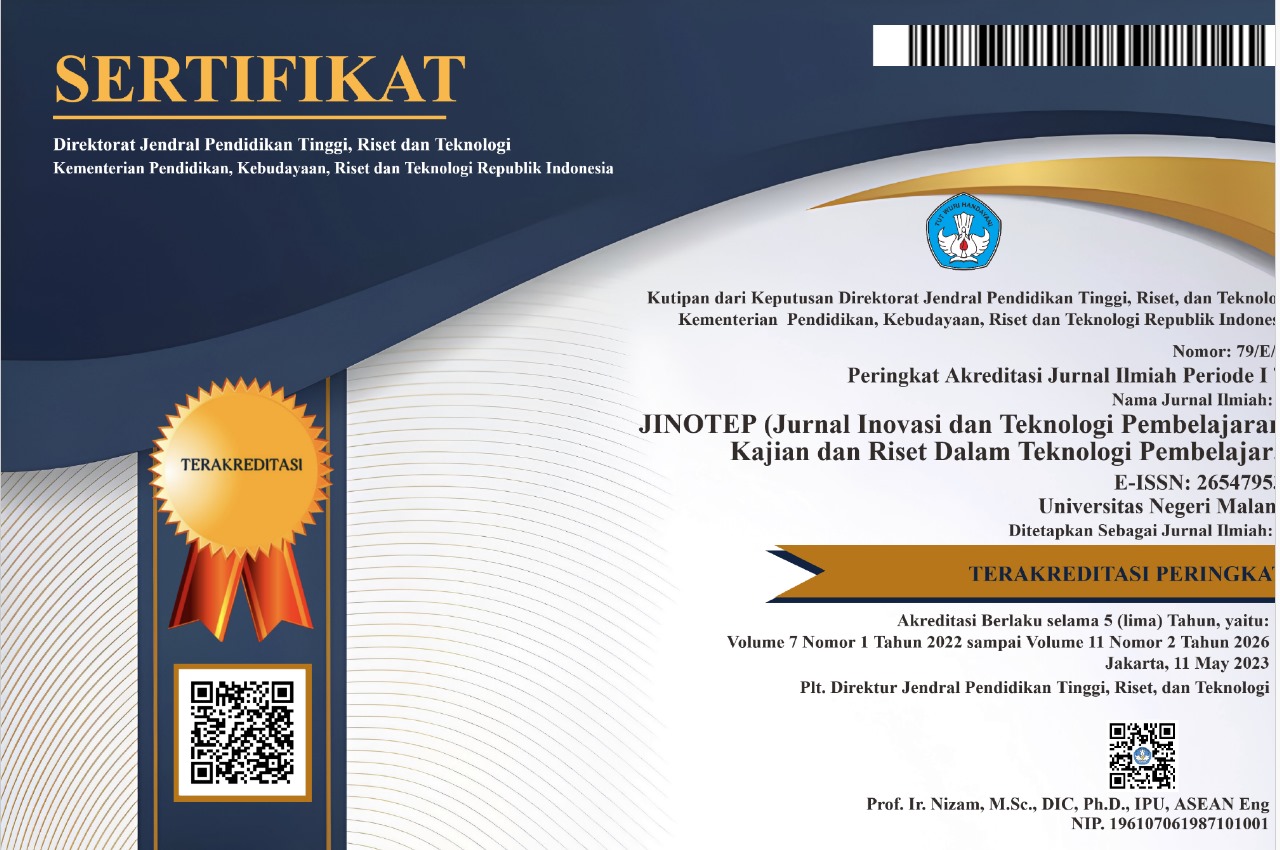Konsep Pendidikan Muatan Lokal Kecakapan Hidup Berbasis Pertanian Melalui Kebun Sayur Sekolah
Abstract
Abstrak: Implementasi Muatan Lokal (Mulok) kecakapan hidup (lifeskill) dalam pembelajaran di sekolah sangat penting untuk menciptakan sumber daya manusia yang bermutu guna menjawab tantangan dimasa yang akan datang. Fakta menunjukkan tingkat konsumsi sayur penduduk Indonesia masih di bawah standar kecukupan dari yang direkomendasikan oleh Organisasi Kesehatan Dunia (WHO yaitu minimal sebesar 200g/kapita/hari. Sebagai perbandingan, tingkat konsumsi sayur di Thailand ialah 300 kg/kapita/tahun. Negara tetangga yang tingkat konsumsi lebih tinggi dari Indonesia ialah Singapura, yang mengkonsumsi 120 kg/kapita/tahun, kemudian Cina, mengkonsumsi 270 kg/kapita/tahun, dan Kamboja yang mengkonsumsi 109 kg/kapita/tahun. Selain itu konsumsi sayuran perlu ditingkatkan untuk mengurangi ketergantungan terhadap beras. Pengkajian penerapan kurikulum kecakapan hidup ini dilakukan dalam rangka mempromosikan peningkatan konsumsi sayur bagi siswa melalui model kebun sayur sekolah. Kebun sayuran sekolah dalam kegiatan ini juga dirancang untuk meningkatkan ketersediaan sayuran bagi konsumsi keluarga. Kebun diatur sedemikian rupa sehingga sayuran dapat dipanen hampir setiap hari dan dirancang menggunakan luas lahan yang kecil karena kebanyakan keluarga di Indonesia tidak memiliki halaman yang luas. Siswa terlibat dalam pemeliharaan tanaman sayuran sebagai latihan bercocok tanam sayur. Setiap panen sayuran direkap dan kandungan gizinya dihitung. Kedepan, perlu penerapan Standar Operasional Presedur (SOP) pelaksanaan kegiatan ini agar dapat berhasil dan mencapai tujuan dari pelaksanaan kurikulum ini.
Abstract: Implementation of Local Content (Mulok) in life skills (lifeskill) in learning in schools is very important to create quality human resources to answer challenges in the future. The fact is that the level of vegetable consumption of the Indonesian population is still below the standard of the adequacy of those recommended by the World Health Organization (WHO ie a minimum of 200g /capita/day. For comparison, the level of vegetable consumption in Thailand is 300 kg/capita/ year. higher consumption from Indonesia is Singapore, which consumes 120 kg/capita/ year, then China, consumes 270 kg /capita/year, and Cambodia consumes 109 kg/capita/ year, and vegetable consumption needs to be increased to reduce dependence on rice The assessment of the application of the Life Skills curriculum is carried out in order to promote increased vegetable consumption for students through the school vegetable garden model. The school vegetable garden in this activity is also designed to increase the availability of vegetables for family consumption. The gardens are arranged so that vegetables can be harvested almost every day and designed using the land area small because most families in Indonesia do not have a large yard. Students are involved in the maintenance of vegetable plants as a vegetable farming exercise. Every vegetable harvest is recapitulated and the nutritional content is calculated. In the future, it is necessary to implement the Standard Operating Procedure (SOP) for the implementation of this activity in order to succeed and achieve the objectives of the implementation of this curriculum.
Keywords
Full Text:
PDFReferences
Abdoellah, Oekan S., Parikesit, Budhi Gunawan and Herri Y. Hadikusumah. 2001. Home gardens in the Upper Citarum Watershed, West Java: a challenge for in situ conservation of plant genetic resources. Paper Presented at International Workshop: Contribution of home gardens to in situ conservation of plant genetic resources in farming systems. 17–19 July , 2001, Witzenhausen, Germany.
Abdurrahman.M.Nur. 2013. Konsumsi buah dan sayur di Indonesia ketinggalan dari negara tetangga.http://health.detik.com/read/2013/06/28/ 190119/2287595/763/konsumsi-buah-dan-sayurdi-indonesia-ketinggalan-dari-negara-tetangga diakses 10/9/2013 pkl.10.03.
Agromedia, Pustaka. 2005. Menanam Sayuran di Pekarangan Rumah. Penerbit Agromedia Pustaka.
Ali M, tsou CS. 1997. Combating micronutrient deficiences through vegetables. a neglected food frontier in Asia. Food Policy. 22: 17-38.
Bushamuka VN, de Pee S, Talukder A, Kiess L, Panagides D, Abu Taher, Bloem M, 2005. Impact of a homestead gardening program on household food security and empowerment of women in Bangladesh. United Nations University Food Nutr. Bull.26 :17-25.
Chadha, M.L. Ray-yu Yang, Satish K. Sain, C. Triveni, Roohani Pal, M. Ravishankar and T.R. Ghai. 2010. Home gardens: an intervention for improved health and nutrition in selected states of India. Procceding of 28thInternational Horticultural Congress.Lisboa, August 22-27, 2010.
Handayani, Sri, 2009. Muatan Life Skills Dalam Pembelajaran Di Sekolah: Upaya Menciptakan Sumber Daya Manusia Yang Bermutu. Prosiding Konferensi Internasional Pendidikan, UPI –UPSI, Malaysia.
Hindun, Iin, 2005. Model Pengembangan Pendidikan Kecakapan Hidup (Life Skill) pada Sekolah Umum Tingkat Menengah di Kota Batu. Humanity, Vol. 1 No. 1 September 2005: 29-35.
IFPRI.2001. Empowering women to achieve food security. Vision 2020. Focus No.6 washington DC, International Food Policy Research Institute.
J.D.H. Keatings, R J Holmer, A.W Ebert and J.A. Hughes. 2010. Less Visible but Yet Vital for Human Health Nutrient Dense Indigenous Vegetables and Their Need for Urgent Promotion in Balanced Diets. AVRDC.
Keatinge JDH, Yang R-Y, Hughes J d’A, Easdown WJ, Holmer R.2011. The Importance of ensuring both food and nutritional security in attainment of the Millennium Development Goals.Food Sec.3:491-501.
Khaw,K, Bingham,S, Welch, A, Luben, R, Wareham, N, Oakes, S & Day, N. 2001. Relation between plasma ascorbic acid and mortality in men and women in EPIC- Norfolk prospective study: a prospective population study. The Lancet, 357:657-663.
Mariyono, J. Dibiyantoro, A., Bhattarai, M. 2010. Improved technologies in vegetable production to support food safety and food security: A case of chili farming in Central Java. Paper presentation of the International Conference on Food Safety and Food Security, 1st-4th December 2010, Universitas Gadjah Mada, Yogyakarta, Indonesia.
Mariyono, J. and Bhattarai, M. 2010. Revitalizing Indonesian rural economy through intensive farming of high value vegetables. The 10th IRSA International Conference., Surabaya, 28-29 July 2010.
Mir, Laura Calvet. 2011. Beyond food production: Ecosystem services provided by home gardens. A case study in Vall Fosca, Catalan Pyrenees, northeastern Spain”, A PhD Thesis, Institut de Ciència i Tecnologia Ambientals Universitat Autònoma de Barcelona.
Nasir, Muhammad, 2013. Pengembangan Kurikulum Muatan Lokal Dalam Konteks Pendidikan Islam Di Madrasah. Hunafa: Jurnal Studia Islamika. Vol. 10, No. 1, Juni 2013: 1-18
Sekretariat Dirjen (Sekdirjen) Hortikultura. 2010. Produksi Tanaman Sayuran di Indonesia Periode 2007-2009.
Sharrock, S.L., and E.A Frison. 2004. Prospect and challenge of biodiversity in small-holder systems. African Crop Science Journal, Vol. 12, No. 1, pp. 51-57, 2004, Uganda.
Stephenson LS, Latham MC, Ottesen EA.2000.Malnutrition and Parasitic HelmintInfections. Parasitol.121:S23-S38.
World Health Organization (WHO). 2003. Initiative to Promote fruit and vegetables for Health Worldwide. http://www.who.int/dietphysicalactivity/fruit/en/index.html diakses 16/1/2013 pkl.14.00
Yunus dan Budiharjo, 2009, Pengembangan Model Kurikulum Tingkat Satuan Pendidikan (KTSP) Pendidikan Kecakapan Hidup (Life Skill Education) Pada Sekolah Menengah Kejuruan (SMK) : Laporan Penelitian. Lembaga Penelitian Universitas Negeri Surabaya
DOI: http://dx.doi.org/10.17977/um031v1i12014p031
Refbacks
- There are currently no refbacks.
Copyright (c) 2014 Kuntoro Boga Andri

This work is licensed under a Creative Commons Attribution-ShareAlike 4.0 International License.
======================================================================
Jurnal Inovasi dan Teknologi Pembelajaran published by Universitas Negeri Malang in collaboration with the Asosiasi Program Studi Teknologi Pendidikan Indonesia (APS TPI) and Ikatan Profesi Teknologi Pendidikan Indonesia (IPTPI) with a MoU.
Publisher Address:
Educational Technology Laboratorium, Building D5, 1st Floor
Faculty of Education, Universitas Negeri Malang
Semarang St. No. 5, Malang City, East Java Province, Postal Code 65145
Email: jinotep.fip@um.ac.id
======================================================================

JINOTEP is licensed under a Creative Commons Attribution-ShareAlike 4.0 International License.
JINOTEP Statistics (Since July 13th, 2020)


.png)




.png)
1.png)
1.png)
4.png)
2.png)
1.png)
1.png)
.png)


_3.png)





1.png)
.png)